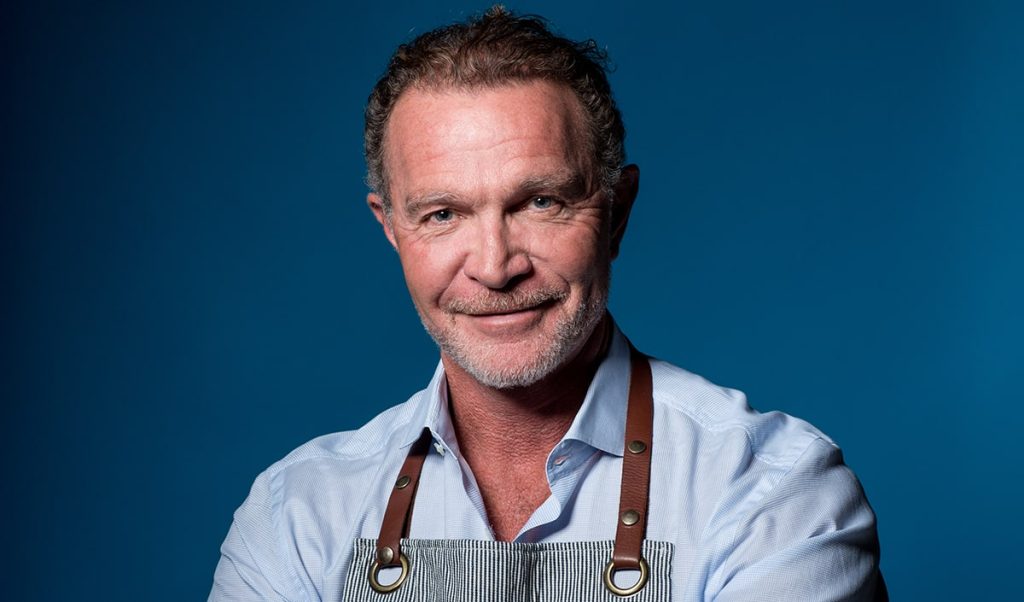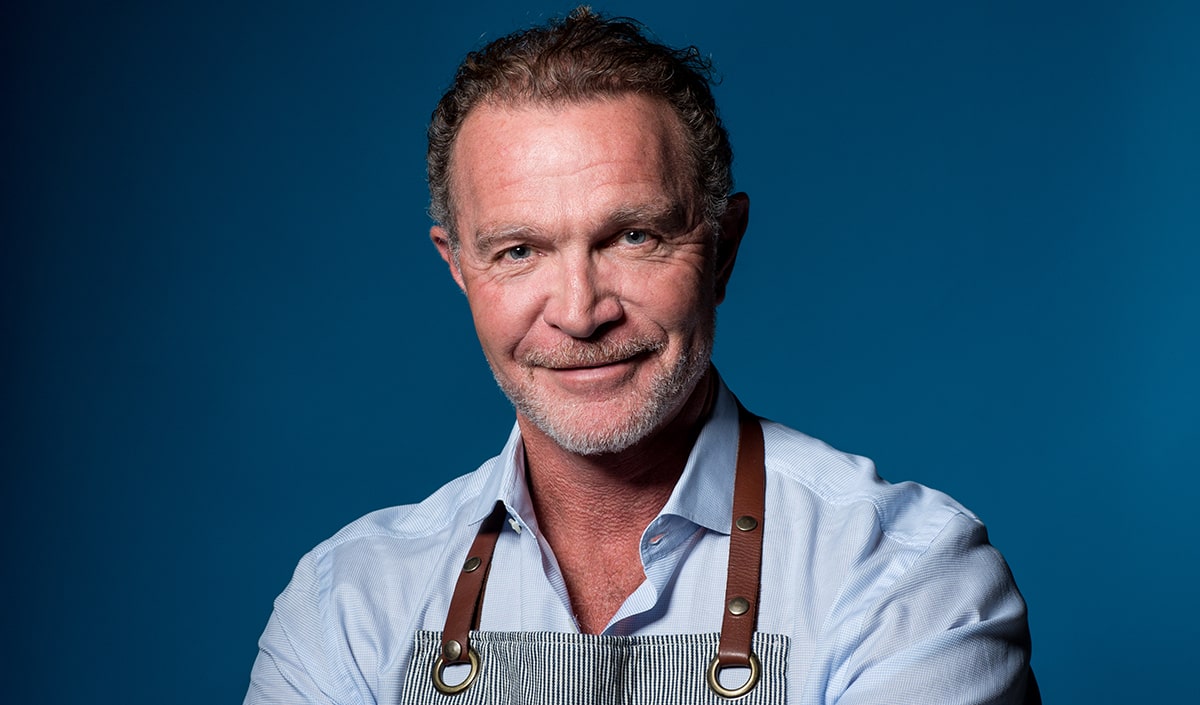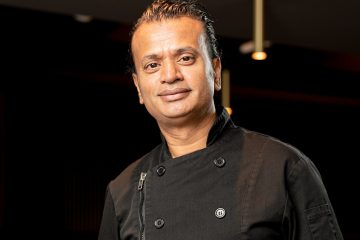Mark Mcewan’s Recipe For Success

With an array of acclaimed restaurants, gourmet food shops, catering and more than a decade on television, chef Mark McEwan has become the face of the food industry in Canada.
From his first job making $1.60 per hour as a dishwasher in Buffalo, NY, to becoming the face of cooking in Canada and head judge on Food Network Canada’s Top Chef Canada, you can call Mark McEwan many things, such as entrepreneur, influencer or innovator. Just don’t call him “celebrity chef.” Says McEwan in a recent and wide-ranging interview with Dolce: “I hate the handle ‘celebrity chef,’ personally.”
So, let’s settle on “very well known” and respected and admired, as McEwan has opened some of Toronto’s best-known restaurants and was part of the movement that introduced elevated cuisine to the city during the 1990s. It’s a far cry from his childhood spent in Buffalo, which he recalls was like playing a role in a 1950s television series.
“Growing up there was great. It was a bit like Leave It to Beaver, to be honest,” recalls McEwan. “A subdivision where every house looks the same, but is painted a different colour, and everybody took pride in their yards. We had a hundred kids just on my block alone, as the average household had three to four kids, some five or six kids, and we had a school nearby. It was a lovely little neighbourhood. All the moms were generally home taking care of their kids, and dad was working. Moms wore dresses those days, and we ate dinner at 6 p.m. It was very nostalgic and very different from today. It couldn’t have been better, so I was a very lucky kid.”
McEwan’s father was executive producer of the CBS Television affiliate in Buffalo, and when he took a job in Canadian television in 1975, the family moved to Toronto. Mark was 18 and just out of high school. With his interest in food and cooking, McEwan enrolled at George Brown College and graduated in 1979. In 1981, he was hired as executive sous-chef by the Sutton Place Hotel, then one of Toronto’s top hotels and a hotbed of celebrity parties and gatherings in the early days of the Toronto International Film Festival. Two years later, McEwan was promoted to chef.
“I think about food in a very approachable way and always with quality as the main focus”
While at Sutton Place, McEwan had the experience of a lifetime in cooking for Pope John Paul II during his papal visit to Toronto in 1984. Turns out the hotel owners had connections in the Catholic Church, and McEwan was asked to cook breakfast and dinner for the Pope for five straight days at the residence of Cardinal Carter of Toronto. “His Holiness would come in the kitchen every day, but he didn’t eat a lot. However, his entourage, they ate a lot,” laughs McEwan.
During his time at Sutton Place, McEwan was inspired and influenced by the great chefs of the times, studying not only what they created but, also perhaps most importantly, how they worked in a kitchen.
“I know a lot of people who think they can cook, but they’re not a ‘coordinated cook,’ says McEwan, making an astute observation. “I think it takes a lot of physical dexterity and natural hand-eye coordination to be a good chef and a working chef. It’s a tough trade. Physically, I was very adept at it, so I fell into it very quickly and found it was easy for me. I don’t think everybody should be a chef. Everybody can cook at home, but to make a living at it, you have to have some natural talent there.”
McEwan has done far more than just make a living at cooking, with McEwan Enterprises Inc. behind some of Toronto’s most notable restaurants in the past 30 years and expanding into gourmet food shops and catering to the influential and elite. His first landmark restaurant was North 44, which he opened in 1990 directly across Yonge Street from Centro, owned by a former business partner. They developed one of Toronto’s great restaurant rivalries, with executives from Toronto’s financial district travelling to this area of north Toronto just for lunch.
He followed up the success of North 44 with Bymark in downtown Toronto in 2002, ONE Restaurant in Yorkville’s Hazelton Hotel in 2007, Fabbrica at the Shops at Don Mills in 2010, the gourmet food supermarket “McEwan” in 2009 and a second location in downtown Toronto in 2015. If this sounds more business than cooking, McEwan says he enjoys both aspects of the restaurant business equally.
“I really enjoy the business side and enjoy coming up with a concept and seeing it through to opening and then sitting across the street and seeing it operate. I find that very satisfying,” he says. “But at the same time, I really enjoy coming up with different food ideas and different concepts. We have a chance to relate to people, really interesting people, as with restaurants and catering, you meet everybody in the city, and there’s very few businesses where you have the opportunity to connect with people over a beautiful plate of food, people otherwise you would never have the opportunity to meet. So I find it interesting on all levels.”
McEwan is quick to point out that, while he has many restaurants and businesses on the go, he can’t be everywhere, and his success is due in large part to the dedicated people he has involved and who share his passion for quality, including his son, Eric, who has joined the company.
“I’m always very generous with the people I work with, as they do the work,” he says. “I’m not in every restaurant in every location every day, so they carry the load of the restaurant; they’re the ones taking care of the clients and cooking the meals. We don’t live in the luxury category all the time, so when we make a burger, I want it to be memorable.”
McEwan’s first book, Great Food at Home, was published in early 2011, and his second book, Rustic Italian, is based upon recipes featured at Fabbrica. While his television projects, first with The Heat, which ran for four seasons, and Top Chef, now entering its 10th year in production, have dramatically increased his notoriety, McEwan is still first and foremost a chef, and it is, and always will be, about the ingredients and the cooking, as well as the creative process he undertakes with his discoveries.
“I pretend I’m eating it while I’m thinking about it, as I know what tastes good and what doesn’t,” says McEwan. “I also know that when food gets very ‘posey-looking’ on a plate, it generally doesn’t taste very good. For me, I’m a little more down to earth, as I like regional foods. And I love food that has a bit of a casual feel about it, or ring to it, and it eats incredibly well. I look at dishes and I look at the seasons and what product is available. You can cook with very humble ingredients and make it just amazing, and that’s where we live as a general rule.”
Being an engaged and active member of his community, McEwan has partnered with the Sunnybrook Hospital Foundation, and, for the past 31 years, he has also been an ambassador for Second Harvest in Toronto, spreading the word about food rescue, insecurity and hunger relief. With the success he has enjoyed with his enterprises, it’s important he gives back to his city.
“We live in a community. And there is an ebb and flow, and you have to be engaged,” says McEwan about his philanthropic efforts. “Second Harvest is an easy charity to love. I’ve been in the fancy food business my entire life, so you’ve never had to look for a meal, but you think of families where kids go to school and don’t eat. Or a single mom with two or three kids, barely squeaking by, and what’s in the fridge? You take food for granted as a chef, but there are a lot of people who don’t know where their next meal is coming from. Second Harvest is a great cause. Through the pandemic, we were feeding first responders and paramedics, and we’re still doing that. We’re sending food to the shelters and to the hostels and to the food centres to feed people. You have to be a part of that.”
Despite all the success of his ventures, his journeys into retailing, cookbooks and television, while at the same time cooking for celebrities and a pope, at his core Mark McEwan remains a chef, and his philosophy clearly shows you can’t take the cook out of the kitchen.
“I think about food in a very approachable way,” says McEwan about his cooking philosophy. “And always with quality as the main focus, as I just want the food to be memorable. I’m 64 years old, so I don’t think I have anything left to prove, other than you better be happy with the last meal you had in one of my restaurants; otherwise, I’m not happy.”
www.mcewangroup.ca
@chefmarkmcewan
Interview by Estelle Zentil












































































